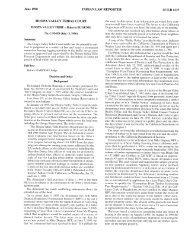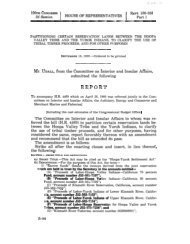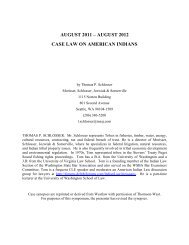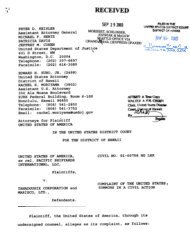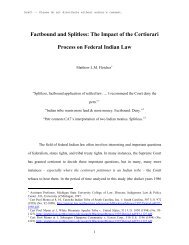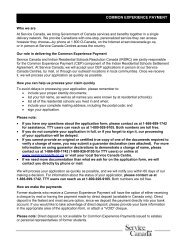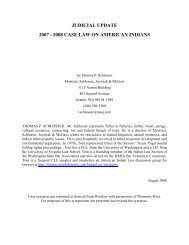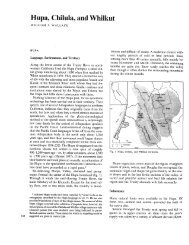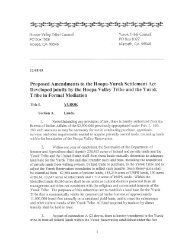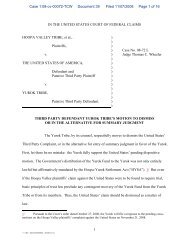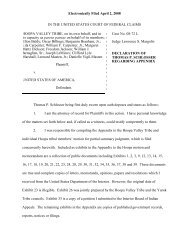Hoopa appendix supporting summary judgment - Schlosser Law Files
Hoopa appendix supporting summary judgment - Schlosser Law Files
Hoopa appendix supporting summary judgment - Schlosser Law Files
You also want an ePaper? Increase the reach of your titles
YUMPU automatically turns print PDFs into web optimized ePapers that Google loves.
24<br />
courts have said. No Indian tribe, before 1988, had a vested right<br />
to the Square or its assets. In 1974, the Federal courts had finally<br />
determined that the Secretary had since 1955 wrongfully made per<br />
capital distributions to only <strong>Hoopa</strong> tribal members and the plaintiffs,<br />
mostly Yurok, were entitled to damages against the United<br />
States. Damages were eventually provided to the plaintiffs for the<br />
years 1955–74 but not for 1974–88. The point is that neither tribe<br />
had title to timber or a constitutional right to the revenues from<br />
1974–88. If the revenues were distributed to one group, the other<br />
group was entitled to its fair share. It did not matter what percentage<br />
of the timber proceeds came from the square or came from the<br />
addition because according to the Federal courts, neither revenues<br />
were vested in either tribe.<br />
In 1974–88, revenues were distributed to the <strong>Hoopa</strong> Tribe, first<br />
under the 30 percent <strong>Hoopa</strong> share totaling $19 million and second<br />
under the Settlement Act. As you are aware, the Settlement Act<br />
placed the 70 percent escrow account which was $51 million, the<br />
small balance of the <strong>Hoopa</strong> 30 percent escrow account, some smaller<br />
joint <strong>Hoopa</strong> Yurok escrow accounts, Yurok escrow accounts, as<br />
well as the $10 million Federal appropriation all in the settlement<br />
fund.<br />
In 1991, the Department split the settlement account between<br />
the two tribes based on our enrollments. The <strong>Hoopa</strong> Valley Tribe<br />
was allocated 39.5 percent of the settlement fund or $34 million.<br />
Because the <strong>Hoopa</strong> Valley Tribe had executed its waiver, the Department<br />
provided these funds to the tribe. The Yurok Tribe was<br />
allocated $37 million and it was put in a Yurok trust account and<br />
was not provided to us.<br />
From 1974 to 1988, timber revenues and interest was approximately<br />
$64 million of which the <strong>Hoopa</strong> Tribe received a total of $53<br />
million or 84.2 percent of this total. Also in 1991, the claims attorneys<br />
for the Short cases sued the United States to try to recover<br />
attorneys fees from the settlement account. Two other Yuroks and<br />
I intervened in this case as co-defendants to protect the Yurok<br />
share of the settlement funds. The United States approved this<br />
intervention and the Justice Department attorneys encouraged our<br />
participation and we won this case.<br />
As you are aware, in 1993, the Yurok Tribe sued the United<br />
States for a takings claim under the Settlement Act. We lost this<br />
case in 2001 when the Supreme Court declined to review a 2 to 1<br />
decision by the Federal Court of Appeals. We lost this case for the<br />
same reason that the <strong>Hoopa</strong> Tribe lost all of their pre-1988 cases.<br />
No part of the pre-1988 <strong>Hoopa</strong> Valley Reservation was vested to<br />
any Indian tribe and none of us had title against the United States.<br />
We could argue that the case was unfair and historically blind and<br />
that it is outrageous to use colonial notions of Indian title in these<br />
modern times but it doesn’t matter. We lost, as the <strong>Hoopa</strong> Tribe<br />
lost before us, and in this legal system, the only appeal we have<br />
left is an appeal to equity and justice before Congress to fix these<br />
wrongs.<br />
At the same time in 1993, we adopted the conditional waiver<br />
which provided that our waiver was effective if the Settlement Act<br />
was constitutional. The courts have determined that the act is constitutional.<br />
That determination should have been sufficient to meet



